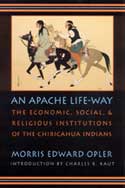 |
An Apache Life-Way
The Economic, Social, and Religious Institutions of the Chiricahua Indians
“First-class . . . in the best ethnographic tradition. It fills a great gap in our anthropological knowledge and . . . deserves to be one of the most used of American tribal records.”—Ruth Benedict, author of Patterns of Culture. Originally published in 1941, An Apache Life-Way remains one of the most important and innovative studies of southwestern Native Americans, drawing upon a rich and invaluable body of data gathered by the ethnographer Morris Edward Opler during the 1930s. Blending the analysis of individual Apache lives with the analysis of their culture, this landmark study tells of the ceremonies, religious beliefs, social life, and economy of the Chiricahua Apache. Opler traces, in fascinating detail, how a person “becomes an Apache,” beginning with conception, moving through puberty rites, marriage, and the various religious, domestic, and military duties and experiences of adulthood, and concluding with the rites and beliefs surrounding death. Morris Edward Opler is Professor Emeritus of anthropology at the University of Oklahoma. Charles R. Kaut is Associate Professor Emeritus of anthropology at the University of Virginia.
530 pp ~ illustrated — ©1996
|

